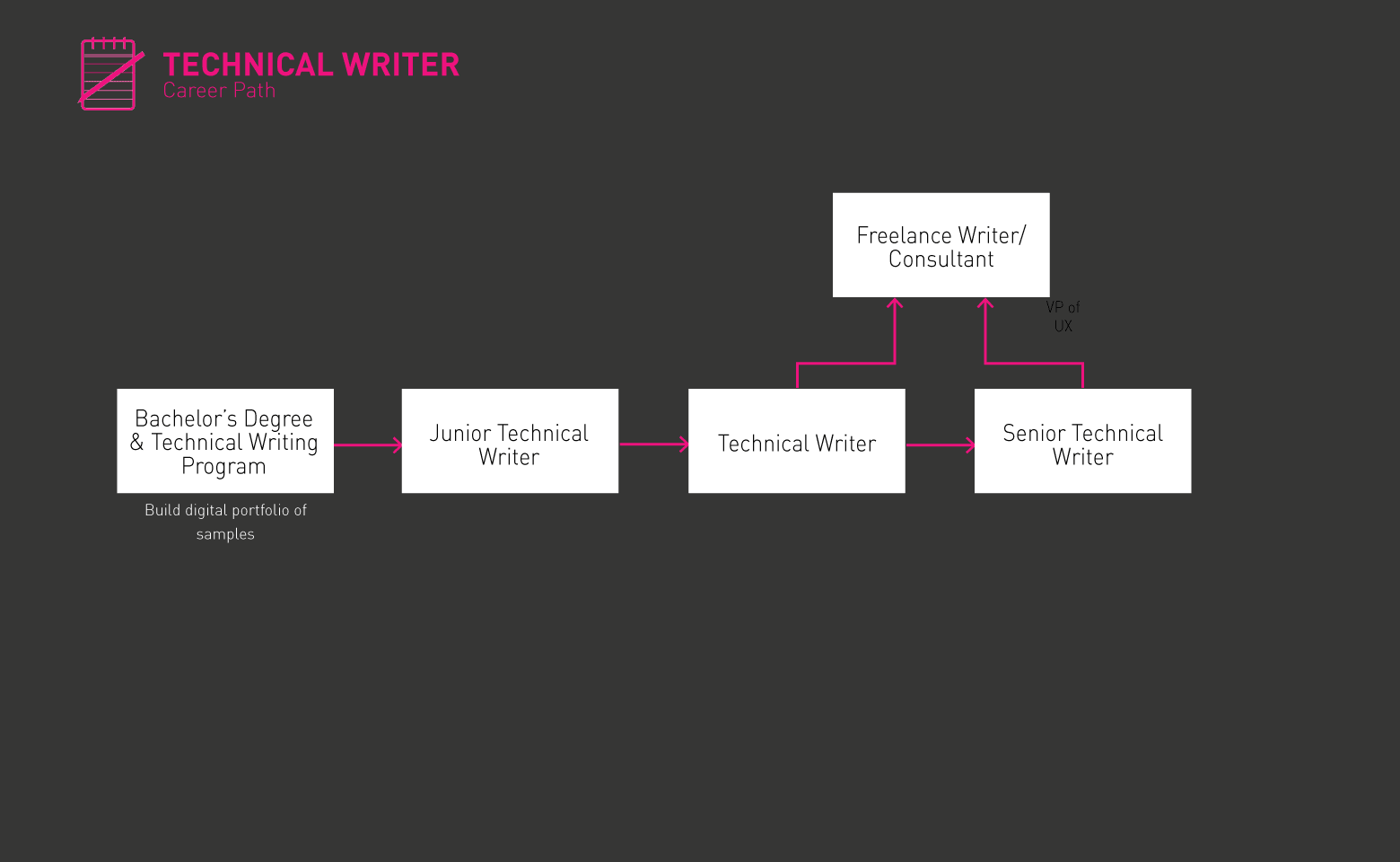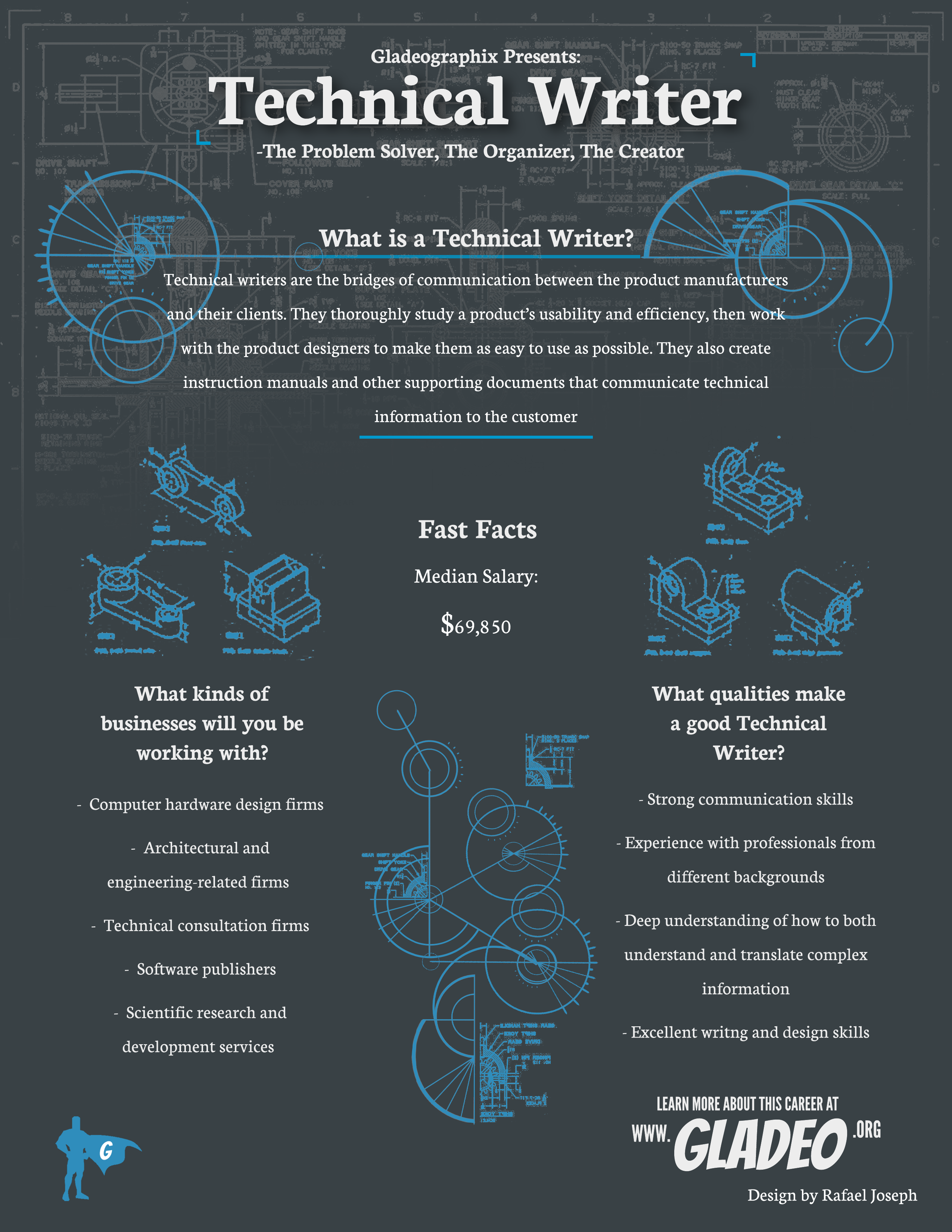Spotlights
Documentation Designer, Documentation Specialist, Engineering Writer, Information Developer, Medical Writer, Narrative Writer, Requirements Analyst, Technical Communicator, Technical Writer
Technical writers develop, gather, and disseminate technical information among customers, designers, and manufacturers. They produce instruction manuals and other supporting documents to communicate complex and technical information more easily.
- In high demand: there are a lot of jobs out there and the demand is growing.
- Exciting new field: Technology is constantly changing and growing. You get to be part of this exciting industry.
- Pay is good right off the bat: A lot of writers when they first start off their career, they have to supplement their writing jobs with other jobs to support themselves. With technical writing, that is not the case.
- Determines the needs of end users of technical documentation.
- Studies product samples and talks with product designers and developers.
- Works with technical staff to make products easier to use, and thus need fewer instructions.
- Organizes and writes supporting documents for products.
- Selects photographs, drawings, diagrams, and charts that increase users’ understanding.
- Gets usability feedback from customers, designers, and manufacturers.
- Revises documents as new issues arise.
- Operating instructions
- How-to manuals
- Assembly instructions
- “Frequently asked questions” pages to help technical support staff, consumers, and other users within a company or an industry.
- Product design changes: After a product is released, technical writers also may work with product liability specialists and customer service managers to improve the end-user experience through product design changes.
Applying their knowledge of the user of the product, technical writers may serve as part of a team conducting usability studies to help improve the design of a product that is in the prototype stage. Technical writers may conduct research on their topics through personal observation, library and Internet research, and discussions with technical specialists.
- Chú ý đến chi tiết
- Sáng kiến
- Writing and communication skills: Often work with engineers, scientists, computer specialists, and software developers to manage the flow of information among project workgroups during development and testing. Therefore, technical writers must be able to understand complex information and communicate the information to people with diverse professional backgrounds.
- Quản lý thời gian
- Tháo vát
- Problem solving skills
- Software skills: Microsoft Office Suite, Adobe FrameMaker, Adobe Creative Suite, Madcap Flare, Author-it, Camtasia Studio, Microsoft Visio, Lotus Notes and HTML coding.
- Computer systems design and related services firm
- Architectural, engineering and related firm
- Management, scientific, technical consulting service
- Software publisher
- Scientific research and development services
In small firms, beginning technical writers may work on projects right away.
In larger companies with more standard procedures, beginners may observe experienced technical writers and interact with specialists before being assigned projects.
You can also work for a:
- Technical consulting firms: work on short-term or recurring assignments.
- Freelance: get paid per assignment.
- Technical writing jobs are usually concentrated in locations with information technology or scientific and technical research companies, such as San Francisco, Los Angeles, D.C., Boston, Austin, Toronto, Ottawa, Vancouver, New York City, Houston, San Diego, Seattle, Portland, Atlanta and Dallas.
- Technical writers may be expected to work evenings and weekends to coordinate with those in other time zones or to meet deadlines.
Increasingly, technical information is being delivered online, and technical writers are using the interactive technologies of the Web to blend text, graphics, multidimensional images, sound, and video.
Increased outsourcing to India, however, because there is still a lot of demand for technical writing and because the best technical writing requires collaborating with other team members, outsourcing hasn’t hit too hard yet.
- Passion for technology and has digital literacy – basically you like computers and technology.
- Loved to write!
- Liked explaining things to people.
- Web design
- Technical Writers often have bachelor’s degrees in a relevant field.
- Suggested majors: Science, engineering, English, history, philosophy. A major in Technical Writing and Communication is not mandatory.
- There are certificates or short-term courses that can be helpful.
- A technical writing course/certification should teach the following skills: analyzing information/research, interviewing, documentation, basic computer/graphic design, presentation, testing, editing, publishing and revising.
- Depending on the nature of the work, they may need a degree in, or in-depth knowledge of, the specific field they are writing about. For example, to write expertly about electrical engineering, you’d need a strong, suitable background in that subject
- Some publishers have their own in-house writing style guidelines to learn; others may default to a standard style. Common technical style guides include:
- Apple Style Guide
- ASD-STE100 Standard (Simplified Technical English)
- Chicago Manual of Style
- Google Style Guide
- Microsoft Manual of Style
- Oxford Manual of Style
- The Handbook of Technical Writing
- Certain jobs may require certification such as:
- Society for Technical Communication - Certified Professional Technical Communicator - Expert
- International Society for Medical Publication Professionals - Certified Medical Publication Professional
- Society for Technical Communication - Certified Professional Technical Communicator - Practitioner
Bấm vào đây để xem danh sách các chương trình.
- Stock up on English, composition, and other writing-related courses, as well as courses in the technical subject matter you intend to write about
- Read technical manuals, books, and blogs related to your subject, and take notes of which areas might be confusing or hard to understand
- Stay up-to-date on the latest developments within the technical industry you write about
- Volunteer to research and write detailed instructions or short “how-to” guides for applicable processes at your school or job site
- Ask for feedback and accept criticism, so you can improve your writing style and make your work more understandable for the intended audience
- Learn to edit objectively and patiently, so your work with be clear, concise, and error-free
- Participate in online discussion forums related to technical writing so you can learn tips and mistakes to avoid
- Don’t overextend yourself by trying to write in too many niches. Focus on mastering a specific area versus trying to be a jack-of-all-trades
- Understand how your audience will consume your content. For example, writing for websites or online courses will differ from writing for a college textbook
- Get your work published online or in reputable journals or magazines! You need to rack up as many publication credits to your name as possible
- Consider joining professional organizations related to your technical area of expertise. If they offer certifications, sign up and add them to your resume after completion
- Write articles for LinkedIn to share with your network (and to expand it!)
- Gain paid experience as a freelancer on sites like Upwork or via Technical Writer internships
- 5.2% with HS Diploma
- 7.3% with Associate’s
- 47.4% with Bachelor’s
- 19.9% with Master’s
- 5.9% with Professional
(% nhân viên từ 25 đến 44 tuổi làm nghề có trình độ học vấn cao nhất)

- Join the local chapter of Society for Technical Communication (STC). Read the "Intercom" and "Technical Communication Journal" to get a background on what is currently being published in the technical writing field.
- Put together a digital portfolio of your writing samples. Here’s how to get samples:
- Volunteer: Call or e-mail your local STC chapter and ask if they have volunteer projects available.
- Learn new programs or skills and write an instructional manual or video tutorial for them. Offer it for free on a website or blog, so that your work has an audience.
- Call local businesses and ask them if they need help creating an instructional manual or technical document. Have some writing samples ready on your website or blog.
- Work on an open source project: Open Office, WordPress, LDS Tech are all open source projects that are available for free on the Internet.
- On your digital portfolio, include any writing awards you have received in the past, technical education you have received (i.e. majored in Computer science, biomedical engineering…etc).
- List your writing clips on your application so hiring managers can get a feel for your work
- Stay open to the idea of doing freelance work until you have enough projects under your belt
- Consider taking Technical Writer intern jobs first
- Build profiles on job portals such as Monster, Indeed, Glassdoor, and Zippia
- Some technical writers begin their careers not as writers, but as specialists or research assistants in a technical field.
- Network at conferences, meetups, seminars, job fairs.
- Go to conferences like Doc Train West, STC Summit.
- Be up to date with the latest and greatest technology: read books, attend webinars.
Các trang web
- American Medical Writers Association
- Hiệp hội Chất lượng Hoa Kỳ
- Association for Business Communication
- IEEE Professional Communication Society
- Hiệp hội các nhà văn khoa học quốc gia
- Hội Truyền thông Kỹ thuật
Sách vở
- Managing Your Documentation Projects, by Dr. Joann T. Hackos
- Technical Writing For Dummies, by Sheryl Lindsell-Roberts
- Technical Writing Process, by Kieran Morgan
- The Insider’s Guide to Technical Writing, by Krista Van Laan
Alternate Careers: Usability specialist, information architect, product manager.
Nguồn cấp tin tức

Công việc nổi bật

Các khóa học và công cụ trực tuyến

Kỳ vọng về mức lương hàng năm
New workers start around $87K. Median pay is $132K per year. Highly experienced workers can earn around $169K.
Kỳ vọng về mức lương hàng năm
New workers start around $71K. Median pay is $88K per year. Highly experienced workers can earn around $147K.
Kỳ vọng về mức lương hàng năm
New workers start around $78K. Median pay is $107K per year. Highly experienced workers can earn around $115K.
Kỳ vọng về mức lương hàng năm
New workers start around $62K. Median pay is $62K per year. Highly experienced workers can earn around $69K.








